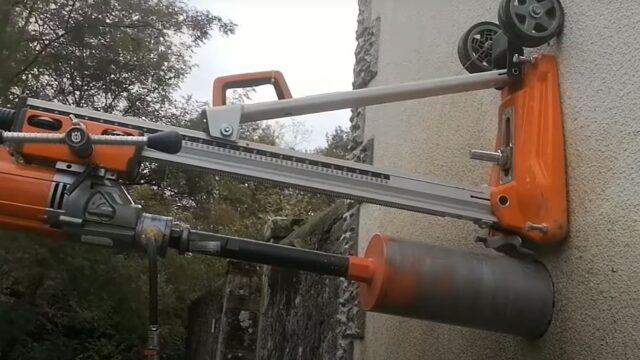When delving into the domain of concrete coring, one often wonders if the age of concrete affects the drilling process. This query is particularly prevalent among Aucklanders planning renovations or additions to their homes. Auckland concrete cutting specialists frequently address such concerns, and this article aims to shed light on the matter, discussing both scientific and technical angles.
The Science Behind Old and New Concrete
Concrete is a composite material made up of aggregate bonded together with a fluid cement that hardens over time. As it ages, its microstructure undergoes various changes which can impact its core drilling ease.
- Curing Process: New concrete goes through a curing process which lasts about 28 days. During this time, hydration reactions occur, making the concrete reach its optimal strength.
- Carbonation: Over time, carbon dioxide in the air reacts with calcium hydroxide in the concrete to form calcium carbonate, a process known as carbonation. This process can make older concrete more brittle and potentially easier to drill.
- Rebar Corrosion: Older concrete structures might have reinforcing steel that has corroded over time. This can pose challenges when core drilling, as corroded rebar may affect the cutting equipment’s efficiency.
Practical Considerations in Concrete Coring
Concrete drilling isn’t just about the age of the concrete. Other variables come into play, such as the type of aggregate used, the moisture content, and any potential admixtures or supplementary materials present.
- Aggregate Type: Hard aggregates, like basalt or quartz, can slow down the drilling process regardless of concrete age.
- Moisture Content: Dry old concrete might pose more resistance during drilling compared to newer, moister concrete.
- Admixtures and Materials: Additives like fly ash, silica fume, or steel fibres can influence the drilling process. While these are more common in modern concrete mixes, they can be found in older mixes if retrofitted for added strength or flexibility.
Auckland Council Bylaw Implications
If you’re in suburbs like Ponsonby or Mount Eden, you must be aware of the Auckland Council’s bylaws affecting concrete coring. Specific codes have been laid out, ensuring safety and procedural correctness during concrete drilling operations. Whether it’s maintaining the structural integrity of a historic building in Ponsonby or abiding by the environmental guidelines in Mount Eden, understanding these bylaws can save potential legal hassles.
Latest Techniques in Concrete Coring
The world of concrete coring is always evolving, with advances in both machinery and technique. Auckland concrete cutting professionals now use:
- Diamond Core Drilling: Harnesses diamond-embedded drill bits for precision and speed, especially suitable for harder aggregates.
- Wet Drilling: Uses water to cool the drill bit and suppress dust, reducing wear and improving efficiency.
- Radar Detection: Before initiating the core drilling process, radar detection is often used to identify rebar or post-tension cables in the concrete.
Analysis Table
| Aspect | New Concrete | Old Concrete |
| Curing Process | Still curing | Fully cured |
| Carbonation | Minimal | More pronounced |
| Rebar Corrosion | Unlikely | Possible |
| Aggregate Type | Varies | Varies |
| Moisture Content | Generally moist | Dryer |
| Admixtures & Materials | Modern mixtures | Traditional/retrofit |
Key Takeaways
- The age of concrete can influence the core drilling process, with older concrete sometimes being more brittle due to carbonation.
- Practical factors, such as aggregate type and moisture content, play significant roles in concrete coring efficiency.
- Staying updated with Auckland Council bylaws is essential for a hassle-free concrete drilling experience in specific suburbs.
- Embracing the latest techniques in concrete coring can assure precision and efficiency in the project.
Frequently Asked Questions:
Does the age of concrete affect its drillability?
Yes, the age of concrete can influence its drillability. Older concrete, having undergone carbonation, might be more brittle, potentially making it easier to drill. However, other factors, like moisture content and the type of aggregate used, can also impact the drilling process.
How does carbonation impact older concrete?
Carbonation is a process where carbon dioxide from the air reacts with calcium hydroxide in the concrete, forming calcium carbonate. This can make older concrete more brittle, which might affect drilling efficiency.
Are there Auckland Council bylaws affecting concrete coring?
Yes, for those living in areas like Ponsonby or Mount Eden, it’s essential to be aware of specific Auckland Council bylaws related to concrete coring. These bylaws ensure safety and procedural correctness during concrete drilling operations.
What are the latest techniques in concrete coring?
Modern concrete coring techniques include diamond core drilling, wet drilling, and the use of radar detection to identify rebar or post-tension cables before drilling.
Does the type of aggregate in concrete influence drilling?
Absolutely. Hard aggregates, like basalt or quartz, can pose resistance during drilling, regardless of the concrete’s age. The aggregate’s type can significantly impact the efficiency and speed of the drilling process.
Is new concrete always easier to drill than old concrete?
Not necessarily. While new concrete is still curing and might be moister, other factors like the type of aggregate used and any admixtures present can influence drillability. Each concrete structure is unique, and its age is just one of many factors to consider.
References:
- American Concrete Institute (ACI)
- This is a leading authority and resource worldwide for the development, distribution, and adoption of consensus-based standards related to concrete.
- Website Link
- Portland Cement Association (PCA)
- Provides extensive information on cement and concrete applications.
- Website Link
- The Institution of Professional Engineers New Zealand (IPENZ)
- They often have papers, articles, and guidelines on various engineering topics related to New Zealand.
- Website Link
- New Zealand Concrete Society (NZCS)
- A non-profit organisation dedicated to advancing engineering and construction in concrete.
- Website Link
- Journals
- Journals like Cement and Concrete Research or ACI Materials Journal often contain peer-reviewed papers on concrete properties, including its age and how it affects various construction processes.
